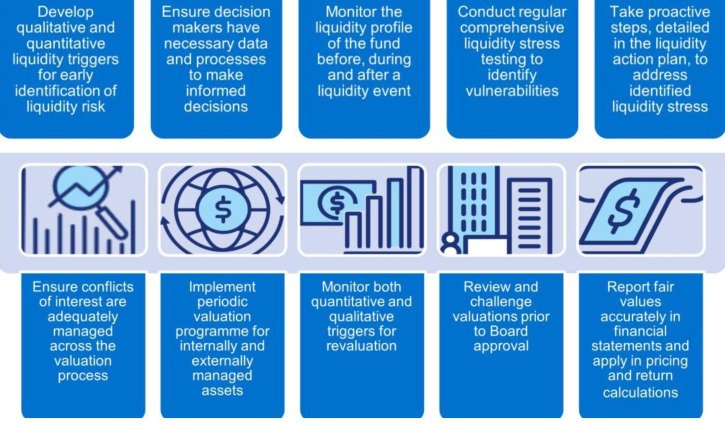Given that they typically account for between 10% and 20% of a super fund’s total portfolio, unlisted assets (including property) and more specifically how they’re valued and when, have become a point of contention for their members and the regulator alike.
Based on the regulator APRA’s (Australian Prudential Regulation Authority) estimates, super funds collectively hold around $500 billion in private (aka unlisted) assets.
Given the magnitude of these numbers, Mary Delahunty, CEO of the Association of Superannuation Funds of Australia (ASFA) admitted that addressing risks related to valuation governance and liquidity risk management remains a critical issue for the industry and a priority for APRA.
Underscoring the significance of these numbers, Stephen Huppert long-standing consultant to the super funds sector told Azzet that asset re-valuations could materially affect the unit price up or potentially down.
Funds that haven't been revalued for some time, adds Huppert could create unforeseen issues for their trustees.
To encourage super funds to act in the best interests of their members, the regulator, APRA has attempted to address the gaps in valuation governance.
While Huppert gives props to APRA for focusing on valuation policies on unlisted assets, he says greater transparency is still required on disclosure requirements and how often revaluations need to be done.
Valuation delays
How often and how quickly funds should revalue their unlisted assets isn’t necessarily cut and dried.
For starters, Josef Pilger, an independent global pension and retirement expert reminds investors that if a super fund relies on outside organisations for data, it must wait until the manager squares its books, which by default means delays.
While Morningstar would prefer to see quarterly fair-value reporting, larger funds tend to carry out more frequent independent valuations of asset classes with higher valuation risk.
Overall, superannuation funds generally use a governance committee or group for valuation oversight.
However, for externally managed assets, funds often place high reliance on the investment manager’s valuation policies and processes, especially for investments accessed through investment platforms.
Fair treatment
Given the technology they can now bring to bear on extracting valuation data, the regulator’s valuation concerns appear to centre more around the fair treatment of beneficiaries who may be entering or exiting the fund.
APRA wants to ensure its members aren’t disadvantaged by the timing of exposure to a particular private investment.
"You need to be able to strike a valuation as people move from one superannuation fund to the other, giving them equitable treatment across funds,” says Ashby Monk, executive director of the Stanford Research Initiative on Long Term Investing.
As a case in point, last year the HESTA super fund paid two cohorts of members who were impacted by the fund’s downward valuation decisions in March 2020, at the beginning of the Covid-19 pandemic.
APRA was concerned that the decision-making processes surrounding the original valuations were neither adequate nor fair.
How an unlisted asset is treated
Under the Corporations Act, a managed investment scheme that holds 20% or more in illiquid (or unlisted) assets is deemed an illiquid scheme and restricted from providing frequent liquidity.
While there is no formal limit on how much super funds can allocate to unlisted assets, they are still required to offer frequent liquidity by accepting applications, redemptions and option switching.
As a result, super funds enjoy unique privileges in how they can include unlisted assets in their portfolios.
Super funds are perceived to be entitled to these privileges based on the superannuation guarantee, preservation rules and the long-horizon nature of super savings.
However, over a third of APRA-regulated super funds are experiencing net negative member flows due to aging membership demographics, competition, and changes in the underlying employment sectors.
Managing liquidity risk
While the investment case for holding unlisted assets is compelling, the Conexus Institute argues that the privilege bestowed on super funds brings with it heightened levels of responsibility.
How super funds manage liquidity risk and asset valuations, according to the Conexus Institute, has implications for member equity such as fairness around the unit prices at which members enter and leave the fund.
Despite APRA’s guidance on what’s expected of super funds, David Bell executive director of The Conexus Institute is disappointed that the regulator’s recent review of governance practices around unlisted assets uncovered some shortcomings.
What APRA found
While many funds do not have best practice valuation processes and/or could improve their risk management, APRA found that every fund needs to do more to formalise member equity frameworks.
According to Bell, the use of unlisted assets by a large and fast-growing super system has given rise to concerns over systemic risk.
“We caution against overstating the systemic risks due to a lack of clear mechanisms to propagate liquidity strains in super across the financial system,” said Bell.
“Super funds are not leveraged and may sell their ample liquid assets to satisfy cash calls, which in turn shuffles ownership of the assets around the system.”
Bell is also concerned that a super fund under liquidity stress may harm its own members as it struggles to sell assets at reasonable prices, grapples with a potentially ‘out-of-shape’ remaining portfolio and responds to any redemption requests.
Where funds struggle
While advanced risk management practices are required to handle these risks - especially as portfolios increase in complexity and funds carry a larger footprint – Bell believes this is where some super funds are struggling.
In light of APRA’s clear expectations, merely following peers and applying rules-of-thumb, adds Bell, is inadequate.
“A fund’s maximum allocation to unlisted assets should be informed by its own net inflow position, not by the allocations of peers that may be experiencing different inflows,” he said.
“If funds aren’t reaching the required standards… then a significant portion of the industry needs to raise their game.”



